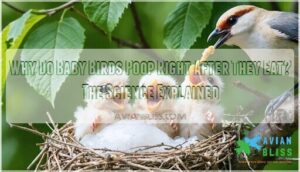This site is supported by our readers. We may earn a commission, at no cost to you, if you purchase through links.

This express-lane digestion fulfills multiple purposes: it fuels explosive growth, maintains nest hygiene through neat fecal sac production, and prevents waste buildup that could attract predators. With parents delivering meals every 15-20 minutes, nestlings can’t afford leisurely digestion – they’ve evolved to extract nutrients quickly and package leftovers for immediate removal, creating one of nature’s most efficient waste management systems.
Table Of Contents
Key Takeaways
- You’re watching nature’s express-lane digestion – Baby birds process food in just 15-30 minutes thanks to their lightning-fast metabolism and specialized gut anatomy designed for rapid nutrient extraction.
- Their waste management system keeps everyone safe – Immediate fecal sac production after eating maintains nest hygiene, prevents bacterial buildup, and reduces predator detection through odor control.
- Parents act as full-time janitors – Adult birds remove or consume fecal sacs within seconds, recycling nutrients while maintaining a spotless nest environment that’s crucial for chick survival.
- It’s all about fueling explosive growth – With babies eating every 15-20 minutes and needing 40% of their body weight in food daily, this rapid elimination system prevents waste buildup while maximizing energy for development.
Why Do Baby Birds Poop Right After They Eat?
Baby birds have incredibly fast digestive systems that work like tiny biological factories. They process food at remarkable speeds thanks to their accelerated metabolism and specialized gut anatomy.
This rapid elimination process starts right after feeding. Their bodies quickly transform nutrients into energy while packaging waste into neat fecal sacs. This isn’t just about waste removal—parent birds often eat these nutrient-rich sacs, recycling valuable resources.
The timing makes perfect sense when you consider feeding frequency. Nestlings eat every 15–20 minutes during daylight hours, so their gut microbiome works overtime breaking down proteins and fats. This quick turnaround keeps the nest clean while supporting their high metabolic demands through specialized intestinal structures built for fast nutrient extraction.
Basically, nestlings poop immediately after eating because their supercharged metabolism processes food lightning-fast, allowing rapid nutrient absorption and waste elimination while keeping their nest hygienic.
Why do baby birds poop so fast?
A baby bird’s digestive system works like a high-speed assembly line. Birds have something mammals don’t—a two-part stomach where the proventriculus breaks down food chemically while the gizzard grinds it up mechanically.
Plus, they’ve got a crop that acts like a holding tank, letting parent birds control when and how much their chicks eat.
What makes baby birds so efficient at digestion? Their gut bacteria and digestive enzymes switch gears fast when their diet changes.
Food rockets through their shorter intestines way faster than it would in mammals.
The real trick happens at the cellular level—nutrients dissolve right through the intestinal walls without needing special transport mechanisms.
What happens when baby birds poop?
Picture a robin chick in your backyard nest. When it poops, you’ll see a neat mucous-covered package called a fecal sac.
The avian digestive system in baby birds is nothing short of remarkable. These tiny creatures have perfected what amounts to a lightning-fast waste removal system—think of it as a high-speed assembly line packed into miniature bodies.
Baby bird digestion works at breakneck speed, processing food in just 15-30 minutes. The digestive process transforms meals into fecal sac composition within this narrow window. This isn’t accidental—it’s evolutionary genius at work.
Here’s what makes this rapid elimination process so striking:
- Your heart would race watching food become waste in real-time
- It’s like having a turbo-charged garbage disposal system
- The speed would make Formula 1 pit crews jealous
- You’d think they’ve digestive superpowers
- Their efficiency puts adult birds to shame
Digestion speed factors include high metabolic rates and specialized gut bacteria. Frequent feeding impact drives this system—babies eat every 15-20 minutes, requiring constant waste elimination benefits. Toxin removal happens simultaneously, keeping these vulnerable creatures healthy while maintaining nest cleanliness through efficient avian digestion.
Why is my Baby Bird not pooping?
Every baby bird has a cloaca tucked inside its body—a clever bit of anatomy that handles multiple jobs at once. Think of it as nature’s all-in-one solution for waste elimination, reproduction, and urinary functions. What makes it especially useful is the specialized muscle control that lets baby birds time their waste release just right.
When baby birds eat, their digestive system works incredibly fast. The cloaca collects both solid waste and uric acid (which is how birds handle what we’d call urine) in a temporary holding area. This speedy digestion turns everything into tidy fecal sacs within minutes of a meal.
The real genius of the cloaca is how it keeps baby birds clean. Those specialized muscles let them hold their waste until mom or dad shows up, then release it right on cue. Adult birds use their cloaca for reproduction too, but babies stick to waste management—which keeps the nest a lot more pleasant for the whole family.
Time flies when you’re having fun, and for baby birds, digestion happens lightning-fast!
Yes, you’ll notice nestlings eliminate waste almost immediately after eating due to their rapid metabolism and efficient digestive systems designed for quick nutrient absorption.
Before waste reaches your bird’s cloaca, something remarkable happens in the gut. The digestive system kicks into high gear, becoming a nutrient-extraction machine that works with stunning precision.
Picture the intestinal walls lined with tiny, finger-like villi – these microscopic structures work like highly efficient sponges, grabbing every bit of nutrition they can find.
What is the white stuff that comes out of baby birds?
White stuff you’re seeing is uric acid, the bird equivalent of urine. Unlike mammals, birds don’t produce liquid urine—they excrete nitrogen waste as white paste alongside darker fecal matter.
How do baby birds digest so quickly?
Lightning-fast metabolism powers you through remarkable digestive efficiency! Your specialized gut bacteria, optimized anatomy, and turbo-charged enzymes process nutrients instantly, fueling rapid growth while your cloaca eliminates waste efficiently.
How does bird poop color vary among species?
You’ll notice species show dramatic color differences based on diet and anatomy.
Pheasants produce grey-green droppings, while woodpeckers create dark, ant-filled waste with white coatings.
Healthy birds usually range from green to brown shades.
Conclusion
Remarkably, nestling birds can process food and eliminate waste in just 15-30 minutes, showcasing nature’s most efficient digestive timeline. This lightning-fast system sustains explosive growth rates while maintaining essential nest hygiene.
What makes baby birds such speed demons when it comes to digestion? Three interconnected factors create this remarkable feat of nature.
Think about what you just learned regarding baby birds’ speedy digestion. The story gets even more fascinating when you dig into how evolution crafted this incredible system. Over millions of years, survival pressures fine-tuned these traits into what can only be called a digestive masterpiece.
[Keypoints]These evolutionary adaptations work together like a well-oiled machine:
- Lightning-fast metabolism processes food at breakneck speed
- Specialized cloaca anatomy manages waste elimination efficiently
- Beneficial gut bacteria boost nutrient breakdown dramatically
- Energy-saving mechanisms redirect power toward growth
Here’s the thing about bird evolution—nesting strategies had to be bulletproof or species died out. When baby birds immediately poop after eating, that’s not random timing. It’s millions of years of natural selection at work. The fecal sac system developed because messy nests were death traps, attracting predators and breeding disease.
Baby birds poop instantly after eating because millions of years of evolution made messy nests deadly predator magnets
What emerged from this evolutionary pressure? Birds that can eat, digest, and eliminate waste faster than most animals can blink. Think of it as nature’s high-speed assembly line, refined through countless generations of life-or-death testing.
These evolutionary adaptations set the stage for an interesting relationship: what baby birds eat determines how often they need waste removal. Take caterpillars and other protein-rich insects. Nestlings that feast on these high-energy meals digest them incredibly fast, which means parents find themselves collecting fecal sacs more frequently.
Your bird’s menu affects everything from gut health to how quickly food moves through their system. Fiber-heavy insects create bulkier waste, while a balanced nutrient mix helps their bodies extract what they need more efficiently.
| Diet Component | Digestion Speed | Fecal Sac Impact |
|---|---|---|
| High-protein insects | Very rapid | More frequent |
| Mixed seed/insect diet | Moderate | Regular schedule |
| Pure soft foods | Fast | Consistent timing |
| Fiber-rich items | Slower | Larger volume |
Here’s what’s interesting: meal quality trumps quantity. When parents bring back subpar food, nestlings can’t absorb nutrients properly. The result? Bigger, more frequent fecal sacs. This connection shows why what goes in matters just as much as what comes out for growing birds.
Baby birds produce varying amounts of waste depending on what they eat, but their parents have turned nest cleaning into an art form.
These feathered janitors don’t mess around – the moment a chick produces a fecal sac, mom or dad swoops in to handle business. Their waste management system puts any cleaning service to shame.
Birds have incredibly fast metabolisms that let them digest food at lightning speed. Their gut bacteria work overtime, their digestive anatomy is built for efficiency, and their enzymes break down nutrients in record time.
This metabolic powerhouse fuels rapid growth spurts while their specialized waste elimination system keeps everything running smoothly.
- https://pmc.ncbi.nlm.nih.gov/articles/PMC4566197/
- https://www.asianscientist.com/2015/10/in-the-lab/baby-cas-birds-poop-sync-feeding/
- https://www.biorxiv.org/content/10.1101/2024.08.09.607319v1.full-text
- https://digitalcommons.usf.edu/cgi/viewcontent.cgi?article=22445&context=auk
- https://www.floridamuseum.ufl.edu/wp-content/uploads/sites/96/2014/10/fecalsacposter.pdf



